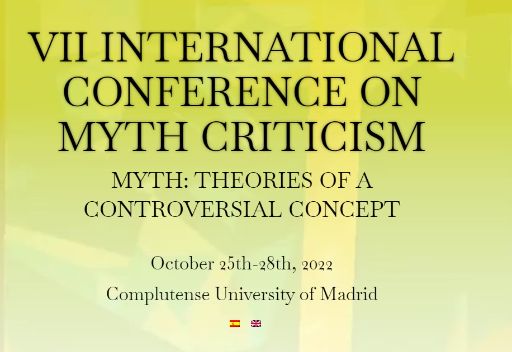
«Myth: Theories of a controversial concept» VII International Conference on Myth Criticism October 25th-28th, 2022, in Complutense University of Madrid
Deadline for submission of registration forms: 15th of May 2022.
The languages of the Conference will be English and Spanish.
The presentations will be in English, Spanish, French*, German*, Italian* or Portuguese*.
*The minimum number of participants in each session is 3, so it will be necessary to count on this number to be able to organise sessions in languages other than Spanish or English. The Scientific Committee of the Congress will write to the applicants after May 15 about the real possibility of organizing these sessions in French, German, Italian or Portuguese.
The Conference will be held on-site and online.
The bibliography on modern reworkings of mythical narratives is immense: Greco-Latin myths in novels and adventure films, adaptations of Celtic, Norse, or Slavic myths in cinema, TV series and comics, the relationships between Eastern and Western myths… The list is endless and somehow overabundant compared to the smaller (though still huge) bibliography of theories of myth. The reason for this disproportion is due, in part, to the difficulty involved in abstracting general criteria. When critics seek to define myth, they must first strip it of spatial, temporal or circumstantial conditioning; only later will they be able to apply the label “myth” to this or that story.
Different key factors of our contemporary society (the phenomenon of globalisation, the dogmas of relativism, the logics of immanence) make the definition of myth even more difficult for the non-specialized public and for academic researchers alike. Indeed, academic reflection has not been immune to contemporary confusion about myth: in the wake of great psychoanalysts, sociologists or ideologues, many researchers apply to their work certain conceptions of myth that identify it with individual sublimations, social deformations, or tendentious ideologies. For this reason, later on, the non-specialized public ―cheered on by the sensationalism of the press― likes to label any fallacy as “mythical”: apparently, the term “myth” cloaks the user of non-mythical discourses with a golden aura.
In addition to these epistemological difficulties, there is another challenge: the prevailing confusion between different correlates of the imaginary. There are many studies that indiscriminately address the domains of esotericism, fantasy, science fiction, and mythology. Coherent studies that dispel vagueness and provide distinctions in the academic critique of these correlates of the imaginary are needed.
All these problems call for a well-founded reflection on a more securely defined notion of myth. Only then will it be possible for researchers to properly address an interpretation of mythical narratives, that is, without previously imposing on the texts what they already intend to discover in them. These questions, among others, are those that the 7th International Conference on Myth Criticism aims to answer.
What is myth? When can a story be classified as mythical? How should we think about myth in our contemporary society? Is it too rigorous to state that myth is inherently tautological and lacks any direct correlation with our real world? In other words, how is it possible that an unverifiable mythical predicate can “refer” to our world? Can myth express any kind of truth? Does it add a knowledge that is coherent with reality? Does it reveal a falsehood? If myth has its own ways of expressing truths about the world, what differentiates it from the postulates of scientific and experimental reason? If myth presupposes the intervention of the numinous, what distinguishes it from religion and literature?
Proposed research areas:
- Classic, Medieval and Modern theories of myth
- Contemporary revisions of myth theory
- Philosophical theories of myth
- Myth and political theory
- Myth and religion: ritual, ceremony, salvation
- Theories of other disciplines applied to myth: Anthropology, Psychoanalysis, Sociology, Linguistics, etc.
- Myth and queer theory
- Theories on immanence and transcendence of myth
- Myth and other concepts: theme, symbol, archetype
- Myth and its imaginary correlates: esotericism, fantasy, magic and science fiction
- Myth as a fallacy, lie, illusion and deceit
- Processes of mythification and demythification
ORGANISING INSTITUTIONS
Complutense University of Madrid
Asteria, International Association of Myth Criticism
Amaltea, Revista de Mitocrítica
ACIS, Grupo de Investigación de Mitocrítica
AGLAYA, Estrategias de Innovación en Mitocrítica Cultural